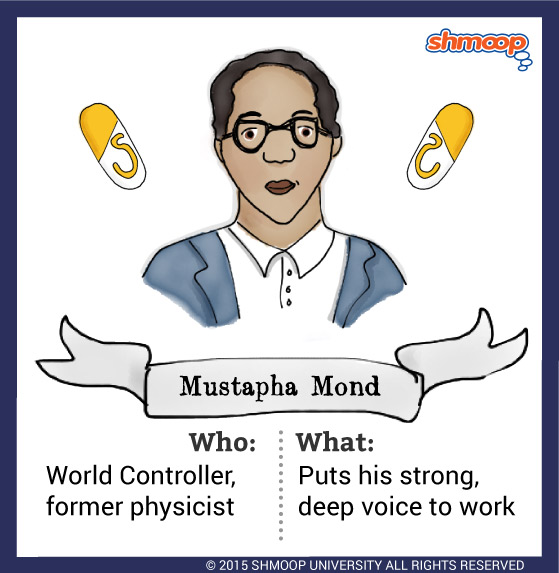Character Analysis

(Click the character infographic to download.)
Mustapha spends pretty much all of his time lecturing, discoursing, dialoguing, and just plain chatting everyone up. This guy is a talker, so it's not surprising to us that Huxley makes a point of noting the quality of his voice. Just look at how his character is introduced: "'The results were terrible.' A deep resonant voice broke startlingly into the dialogue."
Before we know who he is and what he looks like, we know about Mustapha's voice. Shortly after we get mention of "his strong deep voice" and the fact that "his voice sent a strange thrill quivering along [the students'] diaphragms." The very next time Mustapha enters the picture is over the phone, when Bernard hears "the deep, resonant voice of Mustapha Mond." But the big important moment is in Chapter 16, when Huxley drives the message home: "The deep voice thrillingly vibrated; the gesticulating hand implied all space and the onrush of the irresistible machine. Mustapha Mond's oratory was almost up to synthetic standards."
In a word… A-ha! Now we can see the connection. Voices tend to be brainwashing, controlling forces in Brave New World, starting with the soothing auditory hypnopaedia of youth to the synthetic music boxes to the disembodied voice used to calm the riot in Chapter 15. Since Mustapha is a World Controller, it makes sense that he personally embodies one of the key instruments of control.
But most interesting are the few key passages where Mustapha isn't speaking. In particular, we're thinking of that bit in Chapter 12 when we momentarily jump to Mustapha reading a biology paper about purpose and deciding that it can't be published. We see that he admires the paper—which makes sense for a former scientist—but he doesn't really hesitate to trash it anyway. The most we see in the way of internal dissent is a sigh and the thought that life would be so much more fun if one didn't have to think about happiness.
In Chapter 16, the novel picks up with Mustapha right where he left off in Chapter 12. Mustapha declares that "happiness is a hard master—particularly other people's happiness." Then why, oh why, did this former rock-star-physicist choose to abandon science, truth, beauty, and religion, all in the name of other people's happiness?
This is a great question. So great, in fact, that when Helmholtz directly asks it, Mustapha doesn't really give an answer. He explains the choice he was given, but he doesn't explain why he made his decision. This means it's time to speculate. If Mustapha chose to pursue political power over scientific truth, it means that he suffers from the same flawed system of values as Bernard. (Power and status are more important than truth and beauty.) Or, you could argue that Mustapha genuinely believes in the system of the World State; he's not compromising his values, he's fighting for them.
The other big Mustapha question has to do with freedom. Every citizen of the World State, he says, goes through life in a bottle. Alphas have larger bottles, but they're still imprisoned. So… what about Mustapha? Is he is his own ginormous bottle? When you think about the fact that Mustapha "serves" happiness, a "difficult master," he doesn't sound too liberated. On the other hand, he explicitly declares that, since he gets to make the rules, he gets to break them. It sounds to us, once again, that it's time to speculate.